Feeling Generous
Plus mirepoix martinis, deconstructed lemon meringue pie, and three gripping novels.
Hello lovely readers! Since it’s the end of the month, this newsletter will be a longer one that also includes memoir updates, links to published articles, and musings on memorable books, bites, and beverages. The essay is inspired by a word that I use a lot; I love when, the more I think about a word, the more examples show up in my life, especially when it’s in unexpected ways. As always, thank you for being here!
GENEROUS: liberal in giving. Marked by abundance. Characterized by a noble or kindly sort. (Source: Merriam-Webster)
When I dine out, I often thank a server or bartender or restaurant owner for their generous hospitality. When I interview someone for a story, I thank them for being generous with their time. Or I tell a cherished friend or family member that I appreciate their generous spirit. It is important to be generous with our praise and in how we express gratitude, I think.
Part of the etymology of generous is traced back to the 1580s from genus (genitive generis) “race, stock,” from PIE root gene “give birth, beget,” with derivatives referring to procreation and familial and tribal groups. (Source: Online Etymology Dictionary)
I love thinking about generosity begetting more generosity. Sometimes we describe someone as a generous donor, and there is even such a thing as being generous to a fault. But unless you are giving beyond your means, whether of money or energy or emotional currency, I don’t see fault in giving generously so as to give birth to more generosity. Remember: kindness doesn’t cost anything and being kind is a profoundly generous act. If we adopted this mindset and gave generously, imagine what a kinder race we could be, a kinder world it would be.
Generous can also be used to describe proportions. We talk about a generous pour, portion, or serving to describe an abundance of drink and food. Body parts can also be described as generous, which I think is a much kinder way to embrace one’s own body’s own ample qualities: my generous hips and thighs and derrière. It is a way to appreciate their abundance, rather than focusing on what I perceive as faults.
On a recent work assignment, I visited wineries in Northern Virginia and Maryland. After walking through the vines at Maryland vineyard Catoctin Breeze with vigneron Adam Fizyta, we sat down at a table set with six bottles, three different wines, two vintages of each. On the accompanying tasting card, I noticed that Fizyta used the word generous to describe the 2022 Nocturne (a blend of Cabernet Franc, Teroldego, and Cabernet). I asked what he meant by that; when he explained that it referred to the wine’s structure, I had him drill down a bit deeper so that I could better understand the sensations on the palate and know what to look for in the future.
“Generous means it is very broad and fruity on the palate. And it’s giving you a lot of flavor,” Fizyta explained. “And if you have a wine that’s more austere, kind of the opposite of generous, it’s going to be a little bit more shy, a little bit more tight but an indicator that there’s longevity behind that wine…Nocturne is giving you a lot right now. If a wine’s giving you a lot right now, it’s very broad without much tension—only time will tell how it will age, but in general, the more tight and linear the line is on your palate, like up and down in length, the better it will age.”
I loved this wine, the way that its plumminess filled my palate, almost like a wave rushing toward the shoreline and crashing, then lapping up against the sand with abandon. It’s almost like the more generous the wine’s structure, the more magnanimous it is in giving you flavor up front. I like the idea of giving grandly right now, of not holding back, of being open. There is a certain expansiveness suggested by this interpretation of the word generous, expansiveness being something that I’m always interested in exploring whether it’s of mind or body or soul.
In etymology of ‘generous,’ there is also a reference that states “Secondary senses of “unselfish” (1690s) and “plentiful” (1610s) in English were present in French and in Latin.” (Source: Online Etymology Dictionary) It is a reminder that being generous, or unselfish, is a way to ensure plentitude. Rather than being selfish and hoarding—whether wealth, good will, or resources—the act of being generous (unselfish) is a way to ensure a more a plentiful life for those around you, and in turn, yourself. We just have to be bold in feeling generous.
Memoir Updates
In my last extended format newsletter update, I shared the new working title for my memoir: The Woman Who Ate Too Much. I am still really feeling this title, both because of how I’ve structured the book and how it speaks to the themes of appetite and fulfillment therein, but also because I think you can substitute the word “ate” for just about anything that women experience as judgment. We speak too much, we feel too much, we care too much, we are too much. Or the opposite can apply, we are not enough, which is the subtext for all of these things, and “not enoughness” is the universal theme in my book, something that I think we as humans all experience.
I’ve given myself until the end of May to finish this latest round of revision before I hand it off to a trusted editor for a heavy line edit and plot polish. From there, I’ll query agents and also explore possibilities for self-publishing as an alternate route.
Published Articles & Media Appearances
My story about Virginia wineries with exceptional culinary offerings was the cover story of En Forme’s Spring 2025 issue (pictured above). It featured sixteen wineries total, six with a write-up and 10 highlighting perfect pairings, from oysters and mineral-driven whites to craft chocolates and racy reds. Wine is something I’ve yearned to know more about and it was really cool to research how the Virginia wine scene has evolved statewide, especially through the lens of food and the notion of “what grows together, goes together.”
Earlier this month I launched my monthly food column at The Roanoke Rambler, a local online weekly news site t. I’m so grateful to my editor, Henri, for the opportunity and the cool name, and the chance to get to dive more deeply into Roanoke’s food and beverage scene. In case you’re local to Roanoke, it also includes a First Impressions review (March’s was on new bar Show Pony) and an Ask Layla: Where to Eat section, in which I give restaurant recommendations.
Louisiana Creole Caribe Fusion
For my dining review in The Roanoker’s March/April issue, I covered Gianni’s, where owner Sherley Baptiste explores a myriad of Caribbean culinary influences, including her native Haiti, the Dominican Republic, Grenada, and Jamaica. I delighted in sampling fried goat and life-changing braised oxtails, the latter of which were the source of a months-long case of order envy.
To say that opening your own restaurant is a challenge is an understatement, even in the best of times. What an honor to have Franchesca Maglalang, owner of Pinoy Store and Kitchen, share her story of perseverance, grit, and gratitude. I adored the Filipino-style lumpia, tightly wrapped cigars with a generous pork-to-veggie ratio filling, and I can’t wait to return for halo-halo, where she drizzles evaporated milk over finely shaved ice layered with a medley of toppings, including ube, jackfruit, coconut gel, sweetened red mung beans, jellies, and pinipig (toasted rice).
Books, Bites & Beverages
Books:
Books I finished and loved this month include:
God of the Woods by Liz Moore, which I hogged past my library’s due date since I had been on the waitlist for months. Even without the looming deadline, I would’ve devoured this book. It’s a mystery about a missing girl set in an elite summer camp in the Adirondacks that unravels all sorts of family secrets and explores themes of class and privilege, with sparkling prose woven throughout.
Station Eleven by Emily St. John Mandel, which I picked off of one of the New York Times best 100 books list. I can see why it was a National Book Award finalist and I aspire to write this kind of novel someday, with beautiful prose that makes you reread sentences at least twice, but also incredible world building (despite being set at the collapse of civilization after a flu pandemic) and richly developed characters. It’s astonishing to read this book in 2025, 10 years after it came out, 5 years after experiencing our own global pandemic.
All Fours by Miranda July, a provocative novel that explores themes of desire and the pursuit of creative and sexual freedom. The graphic sex scenes are attention-grabbing, but what made the prose so propulsive was the character’s interiority and trying to understand what drives her to satisfaction outside of the bedroom.
Bites:
One of the most memorable bites from my recent visit to Frederick, Maryland was in the form of dessert from Wye Oak Tavern, a posh steakhouse the Voltaggio brothers recently opened in The Visitation Hotel. It was a playful, deconstructed take on lemon meringue pie, with perfect spheres of a tart-and-tangy lemon curd set with gelatin, flanked by scoops of coconut sorbet and amply scattered with toasted coconut streusel. Overall, the dessert was light, balanced, and not-too-sweet with plenty of visual and textural intrigue.
Beverages:
Hands down the most delicious cocktail I’ve had the pleasure of sipping so far this year is the Mirepoix Martini from Wye Oak Tavern. There are five martinis to choose from the cocktail menu’s martini service, but I couldn’t resist the most savory and unusual-sounding of the bunch. Among its ingredients, the Mirepoix Martini listed carrot-infused vodka, navy-strength gin, dry vermouth, espelette pepper, and celery bitters. The cocktail had a pleasant vegetable quality with a botanical backbone from the gin, plus a clean, grassy finish. The presentation was gorgeous, complete with a pickled carrot, onion, and celery garnish, and I loved that they served the remaining martini in a glass bottle on its own bed of ice.



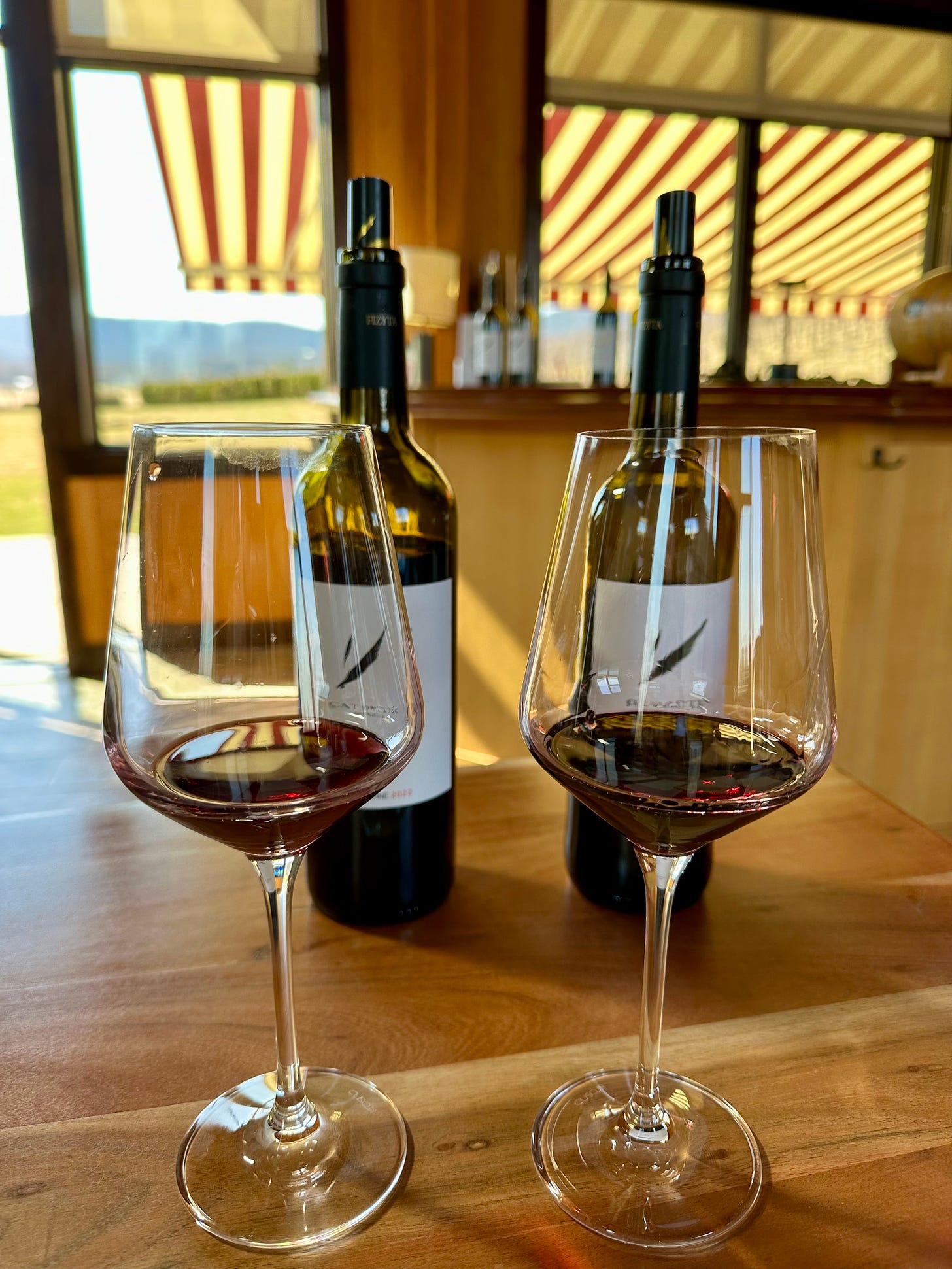
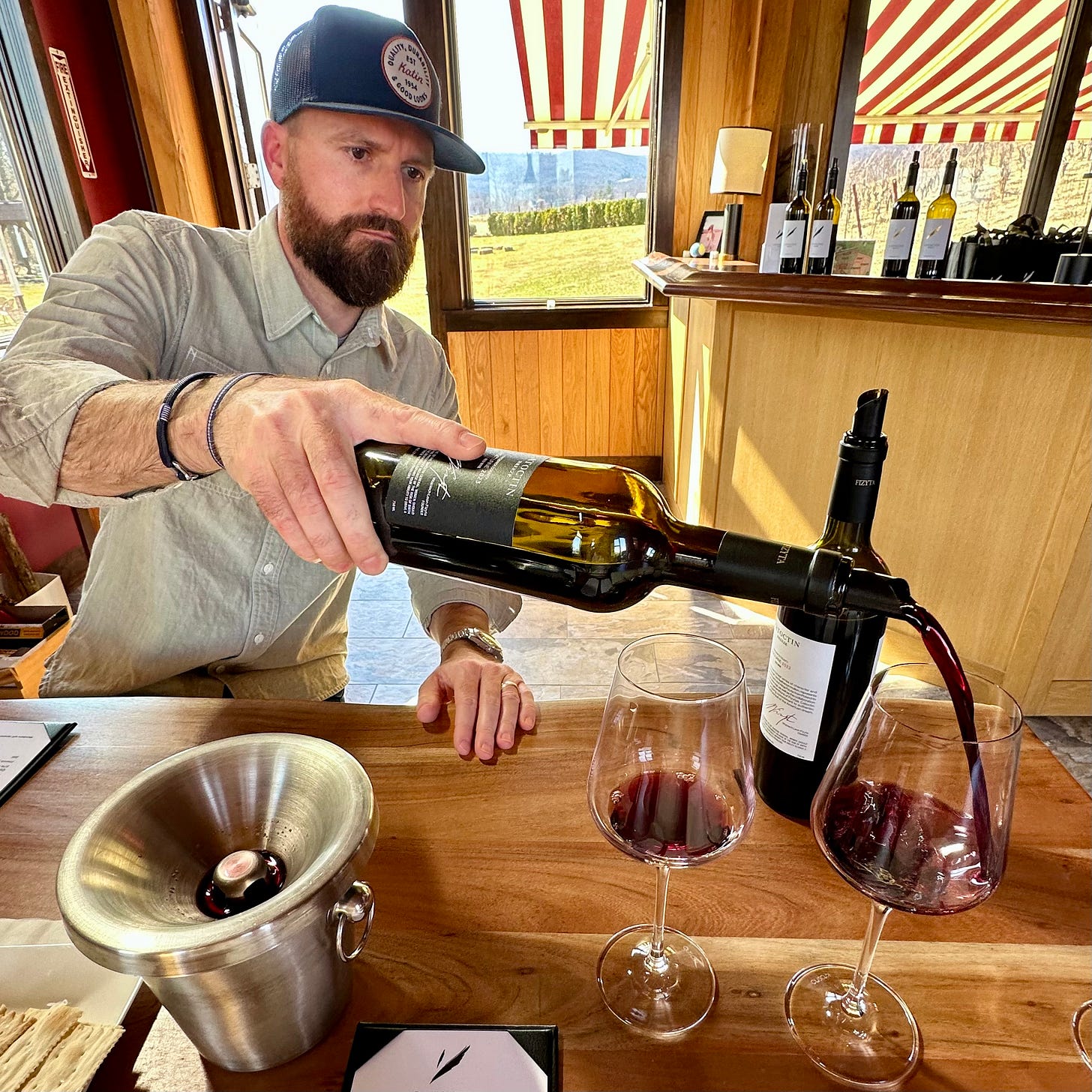
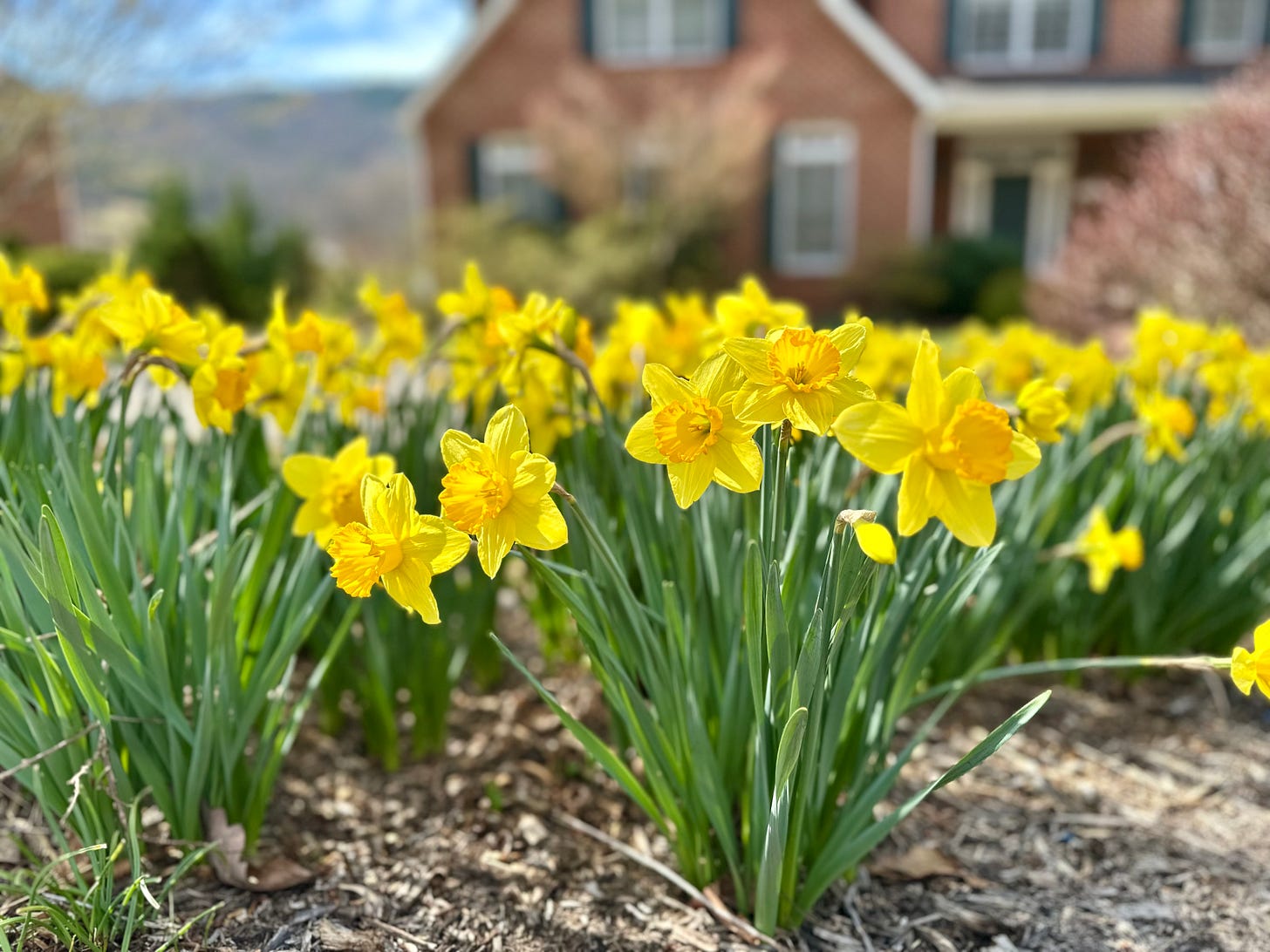
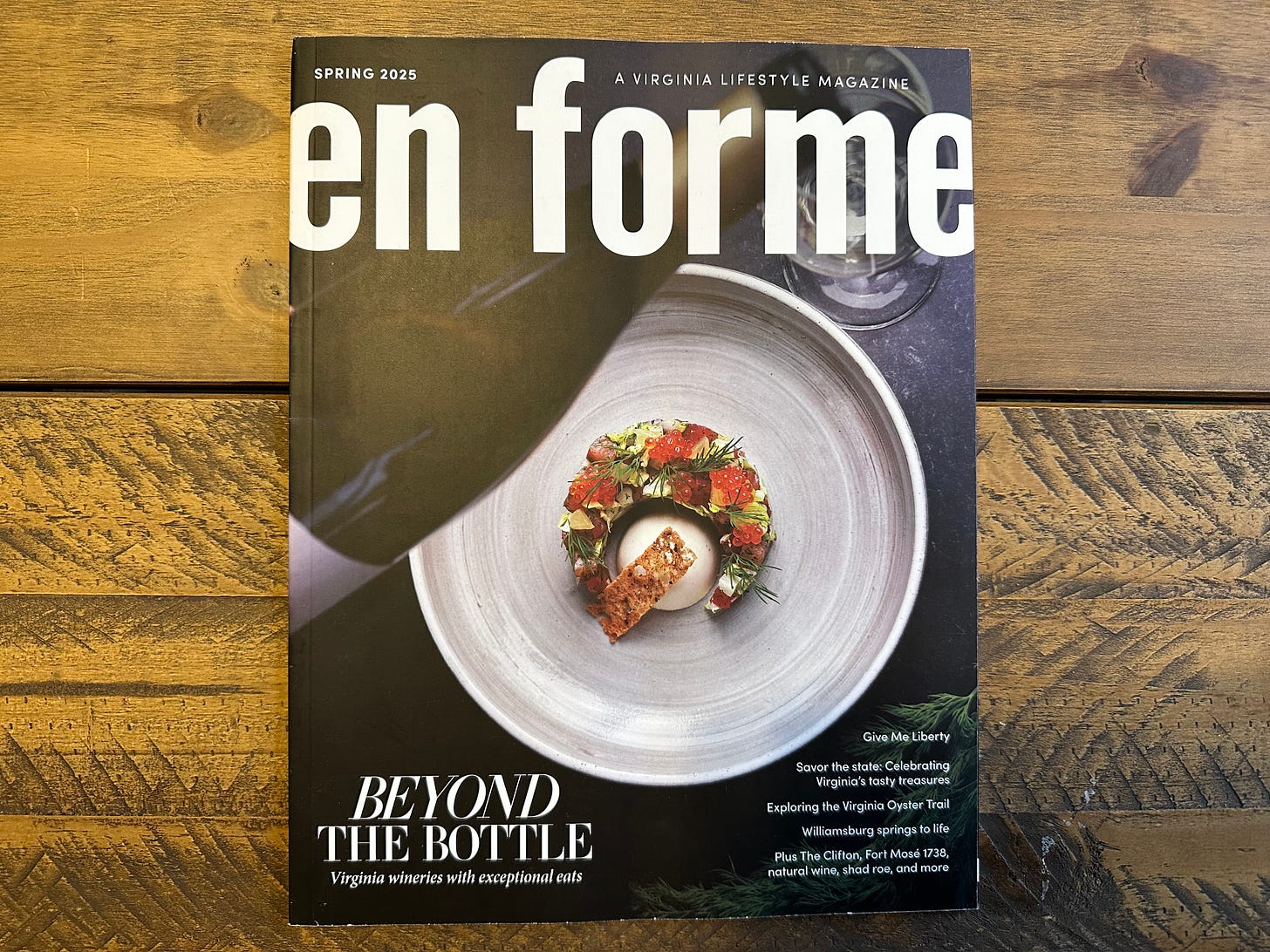
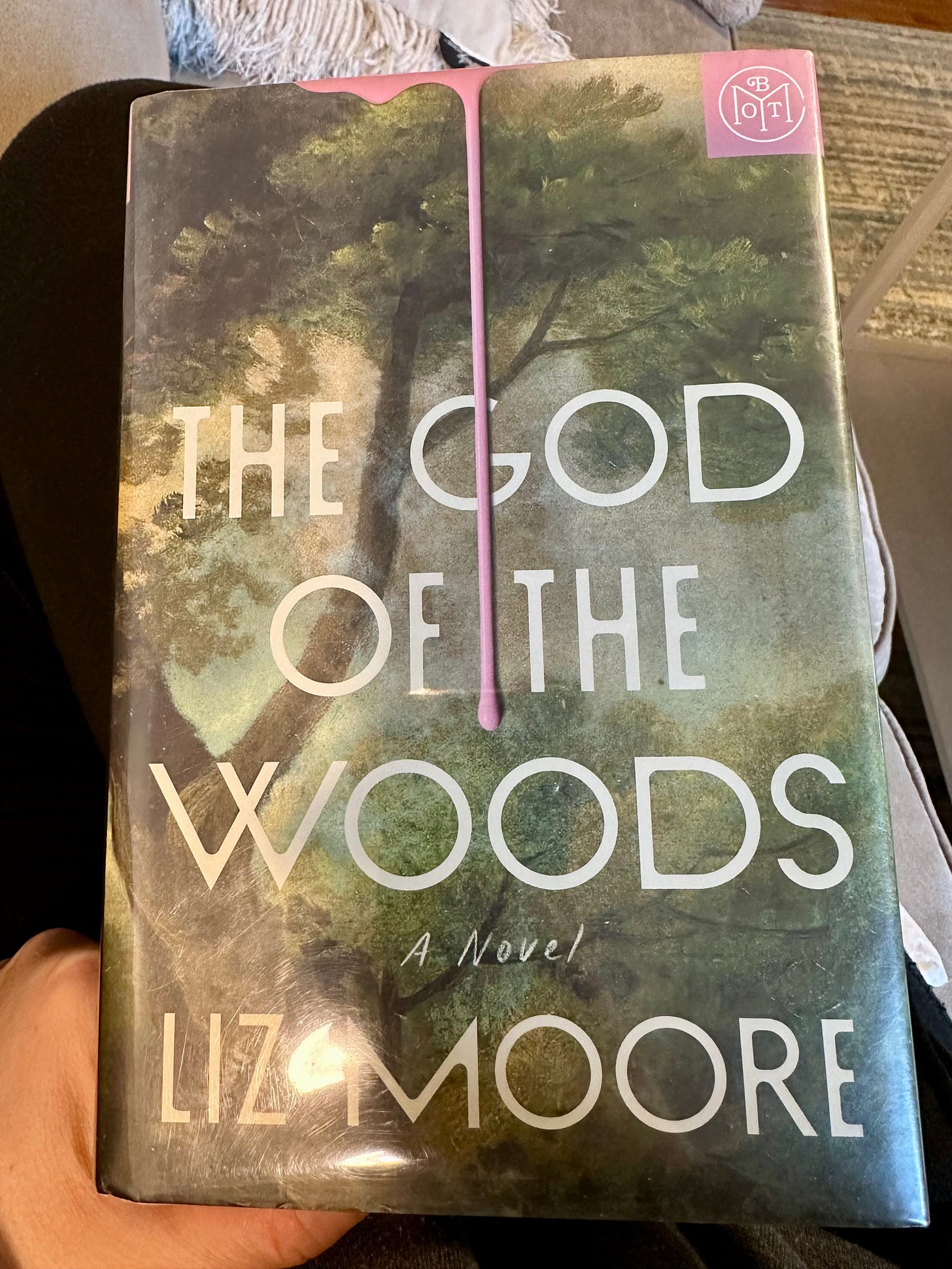
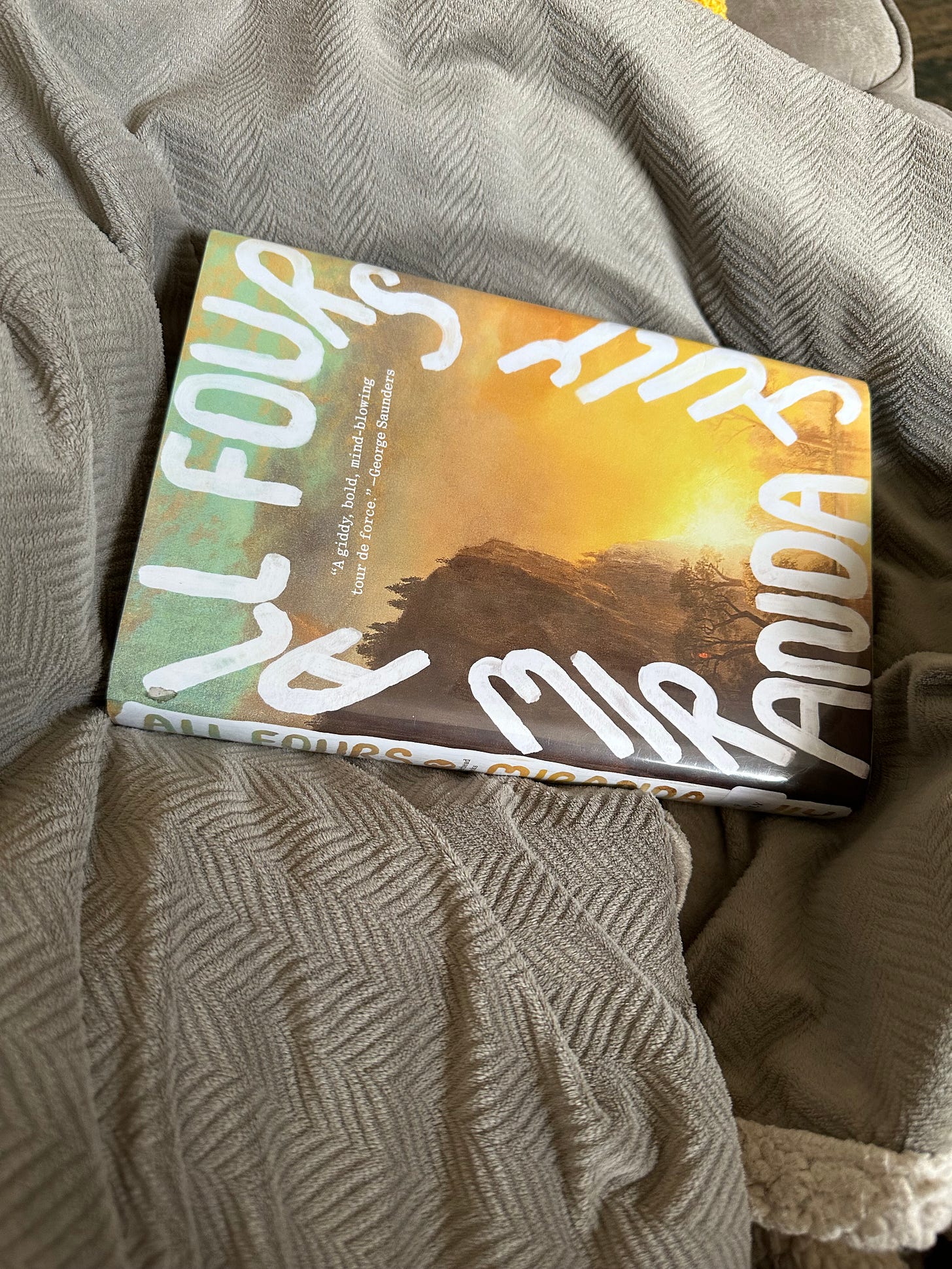
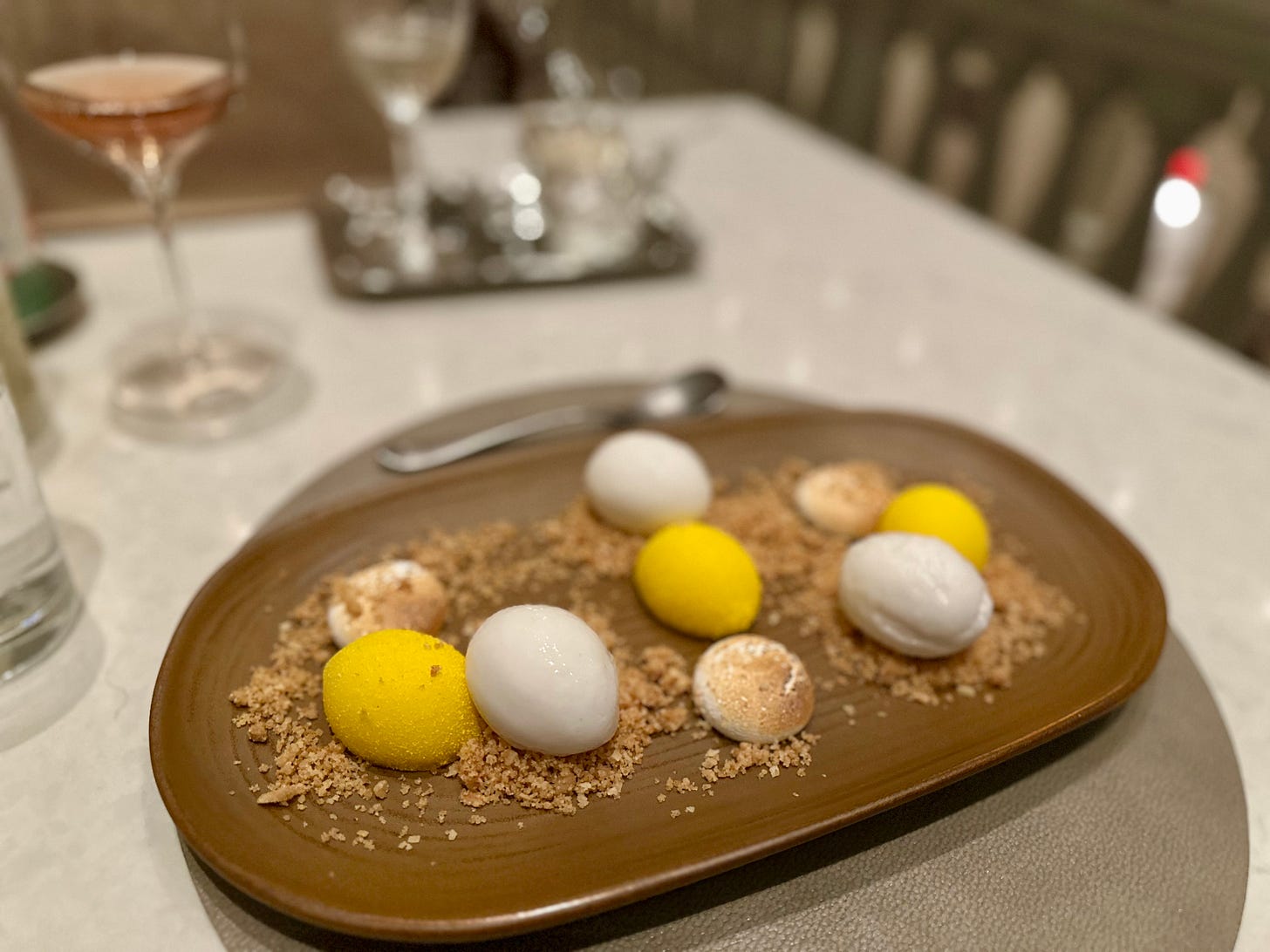
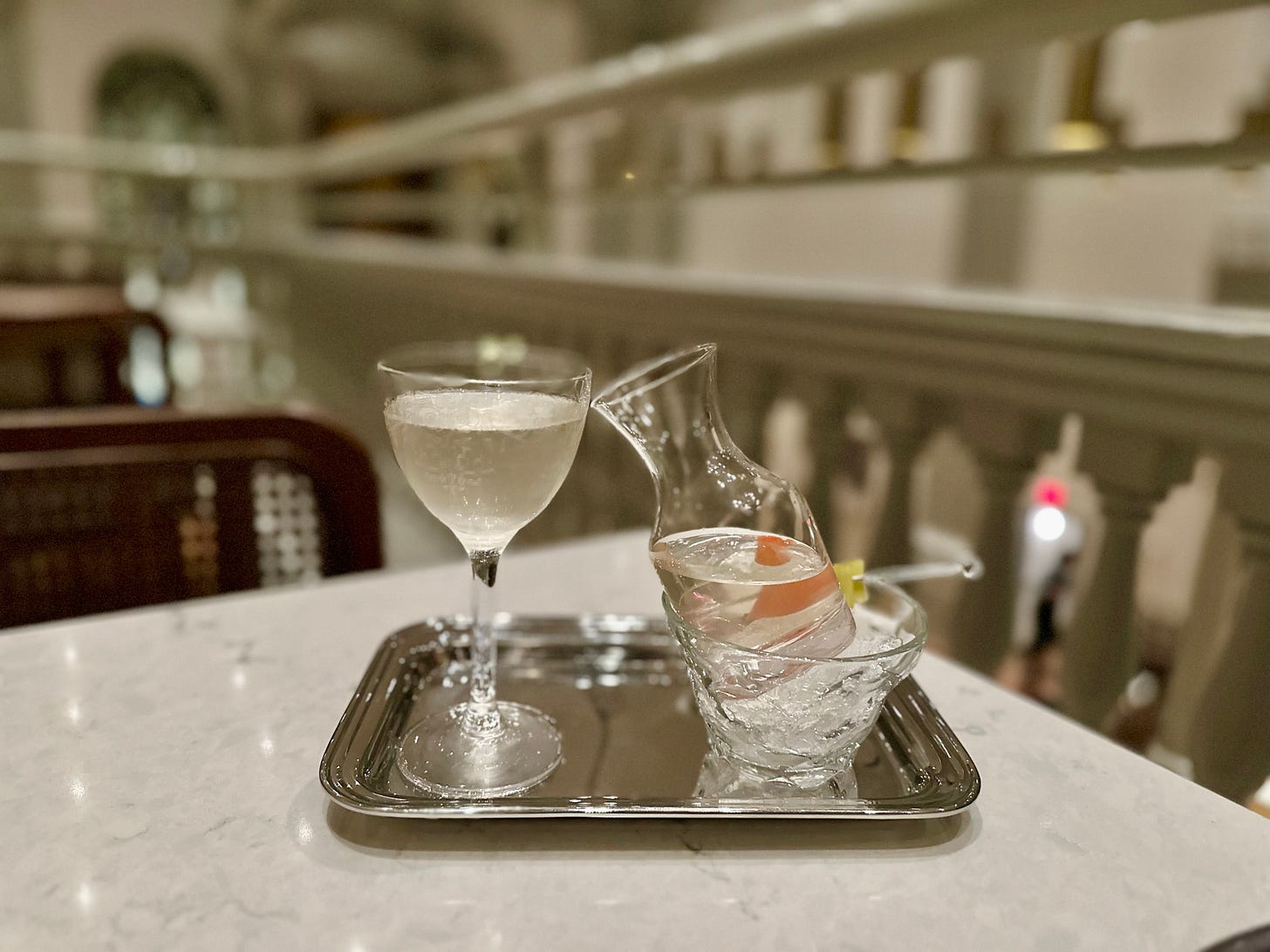
Layla, this reflection on “generous” was everything — expansive, nourishing, and deeply human. I love how you wove together etymology, wine tasting, body image, and emotional truth into one rich tapestry. That line about generosity begetting more generosity really stuck with me, especially in the context of creative work. It’s a reminder that writing itself is an act of giving — and you give so much in every post.
Also: your description of the Nocturne wine as a wave crashing and lapping at the shore? Gorgeous. Made me want to sip and listen. And The Woman Who Ate Too Much — what a brilliant, provocative title. Subversive and tender at once. I’ll be first in line when it’s out.
Thanks for being so generous with your words. They land.